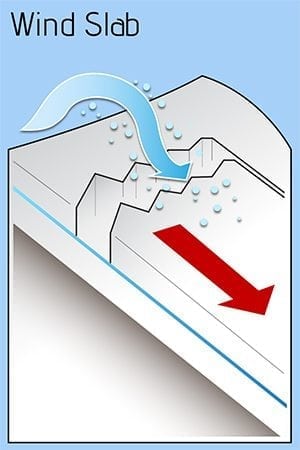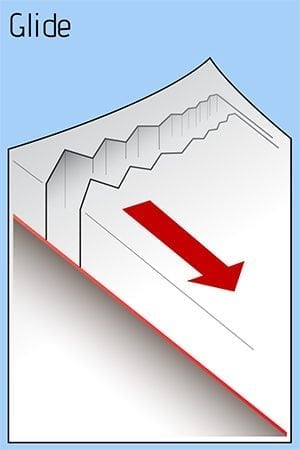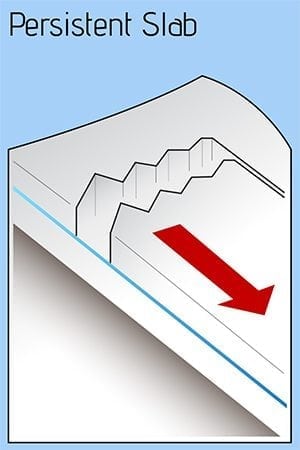Valdez
Above 3,000ftConsiderable
1,500 to 3,000ftModerate
Below 1,500ftLow
Degrees of Avalanche Danger
Avalanche Problems
Problem 1
Likelihood:
- Almost Certain
- Very Likely
- Likely
- Possible
- Unlikely
Size:
- Historic
- Very Large
- Large
- Small
Trend
- Increasing
- Steady
- Decreasing
Problem 2
Likelihood:
- Almost Certain
- Very Likely
- Likely
- Possible
- Unlikely
Size:
- Historic
- Very Large
- Large
- Small
Trend
- Increasing
- Steady
- Decreasing
Avalanche Activity
12/18- A large glide release was reported off Snowslide Gulch.
12/15- Observed small natural avalanche on west aspect of Goodwills. Released below a cliff band at the bottom of a slope, 100′ wide. SS-N-D1-N
12/8- An observer witnessed a glide crack avalanche. SW aspect of peak 4690′ above the Valdez Glacier Lake. The debris reportedly ran all the way to the lake, with the deposition pile only feet away from a well used cross country ski trail.
Weather
12/19- High pressure will ease into south-central Alaska over the next few days. This high pressure will usher in the coldest temps of the year and strong outflow winds. Expect dangerous wind chill in Thompson Pass.
The Thompson Pass Mountain Forecast covers the mountains (above
1000 ft) surrounding Keystone Canyon through Thompson Pass to
Worthington Glacier.
This forecast is for use in snow safety activities and emergency
management.
Today Tonight
Temp at 1000` 23 F 9-15 F
Temp at 3000` 16-24 F 4-15 F
Chance of precip 20% 20%
Precip amount
(above 1000 FT) 0.02 in 0.03 in
Snow amount
(above 1000 FT) trace trace
Snow level sea level sea level
Wind 3000` ridges NE 20-35 mph NE 25-45 mph
| 24h snowfall (inches) | HN24W (inches)* | Hi Temp (F) | Low Temp (F) | Dec snowfall | Season Snowfall | |
| Valdez | 0 | 0 | 31 | 24 | 7 | 31 |
| 46 mile | 0 | 0 | 13 | 6 | – | – |
|
Nicks snotel (4500′) |
0 | 0 | 24 | 15 | – | – |
HN24W= total water received last 24 hours in inches
Additional Information
As high pressure moves in, north winds are forecasted to ramp up and become widespread. There is up to a foot of dry snow available for transport. Strong north wind will redistribute the surface snow and form windslab on lee aspects that could be sensitive to triggers.
With the first real cold snap of the season, we should be looking for the snowpack to begin to lose strength at the surface and below. Surface hoar up to 4 mm has been observed up to brushline on Thompson Pass. Much of this will likely be knocked down by wind, but not in protected areas where it will continue to grow with falling temperatures. Below the surface, we have two significant rain crusts in the top meter of the snowpack below 4500′. These layers, which are currently strong, will begin to lose strength as they form facets. The longer the cold snap is, the more these layers will lose strength.
The avalanche hazard is considerable today in the upper elevations. Fresh windslab is forming and could be reactive to triggers. It is also possible that avalanches could step down into deeper layers of the snowpack and create much larger avalanches. Only expose one person to a slope at a time and avoid slopes that are receiving active wind loading.
The further north you go from Thompson Pass, expect thinner snowpacks. Triggering an avalanche on a persistent weak layer will be more likely in the continental zone.
If you have traveled in the mountains, please leave a public observation. The more info we can get from various locations will help us to get a clearer picture of the snowpack in our beautiful Valdez Chugach!
Forecast Confidence is Low.
Announcements
The avalanche hazard is considerable at upper elevations. Human triggered avalanches are likely on steep terrain in areas that have recently been loaded by north wind. Good indicators for windslab are a rapid increase in depth of the new snow over a short distance, and a hollow, drum-like feel. Shooting cracks will indicate unstable snow. Use caution in the mountains today, avoid areas that are receiving active wind loading and avoid terrain traps.


